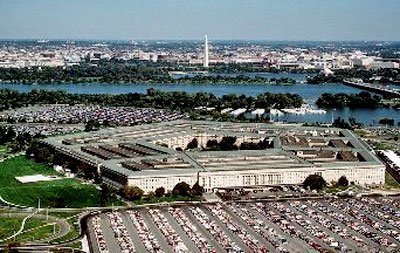
by Reza Kahlili
August 07, 2011
from
WorldNetDaily Website
|
Reza Kahlili is a pseudonym for an
ex-CIA spy who requires anonymity for safety reasons.
He is a Senior Fellow with
EMPactAmerica and the author of
A Time to Betray, a book about his
double life as a CIA agent in Iran's Revolutionary Guards, published
by Threshold Editions, Simon & Schuster, April 2010.
A Time to Betray was the winner of
the 2010 National Best Book Award, and the
2011 International Best Book Award. |

The Pentagon
Iran is planning to retaliate against the United
States for the sabotage against its nuclear program, according to an
editorial in the Kayhan newspaper, the mouthpiece of Iran's supreme leader,
Ayatollah Ali Khamenei.
The U.S. has all of its infrastructure connected to the Internet, the
editorial says, and as a result,
"it is constantly worried about an unknown
player, who they will never be able to identify... sitting in some
corner of the world who would launch an attack on a sector of (the
Americans') foundations. They will be taught the mother of all lessons."
Specifically, Iran is looking into launching a
cyber attack against U.S. electrical grid systems.
Iranian officials are furious over
the July 23 assassination of nuclear scientist
Dariush Rezai-Nejad, who was working on electric detonators for the
Iranian nuclear program, which can be used on missiles or nuclear bombs. He
was the third Iranian nuclear scientist assassinated since 2009.
The frustration over acts of sabotage started with the
computer virus Stuxnet in which 1,000 of
Iran's centrifuges at the Natanzs nuclear facility were destroyed and had to
be replaced. The virus also attacked the Bushehr nuclear power plant, which
has resulted in repeated delays in it joining the country's power grid.
The July 29 Kayhan editorial
threatening America with retaliation
said that during the last months, the United States has published two
strategy documents regarding cyberspace, both of which emphasize the
ever-evolving nature of Internet communications:
The first document, signed by President Obama, lays out the country's
strategy on cyberspace, states that the Internet epitomizes great
opportunity and says it is not viewed as a threat to the United States, the
editorial says.
It adds that,
"it can be suggested that the U.S. can play
a leadership role in cyberspace in that the U.S. would create and
maintain that position for the long term."
But then the editorial takes direct aim at
Washington:
"The second document is brimming with the
over-confidence and hyper-intellectual posturing of the first. These
documents, which the Pentagon published two weeks ago, use
straight-forward war vernacular and (the Pentagon) has openly announced
that from here on in, cyberspace will be considered a war zone.
"The laughable part of this document is when the neurotic American
generals threaten hackers sitting behind their computers who attack
America (that they) should be careful that a cruise missile does not fly
in through their heating pipes to destroy their turf."
The United States is no longer the
unequivocal leader of the Internet, the editorial says.
"Diverse and interesting players have now
come on the scene and have… managed to inflict some costly and
unprecedented damages on the American Internet infrastructure…
Due to the convenient global nature of the
'players,' their network operates outside time and space. They can be
anywhere from right under Mr. Obama's ear in Washington, D.C., to the
depths of the African desert."
The editorial accuses the Americans, with the
help of Israelis and Germans, of creating the Stuxnet virus to attack
the Iranian nuclear enrichment facilities.
"Americans are under the (mistaken)
impression that they are the only ones who can strike violent blows
against their most ardent opponents and not sustain any real damage,"
the editorial warns.
Earlier this year Iranian officials announced
that Iran's cyber war campaign would be activated under the Passive
Defense Organization of Iran, which openly recruited hackers who would
support the goals and ideals of the radicals ruling Iran.
Also as reported earlier, in a recent meeting
among Iran's Revolutionary Guard commanders and Iranian scientists,
America's vulnerabilities for a cyber attack were discussed. They concluded
that the U.S. power grids represent the best opportunity for such
attacks, as more U.S. utilities are moving their control systems to the
Internet and using smart-grid technology.
According to reports from the U.S. Department of Energy, America's power
grid remains vulnerable to cyber attack, a result of slow implementation of
computer security standards.
A successful cyber attack on the North American
power grid systems could disrupt the economy and possibly create a national
trauma.

